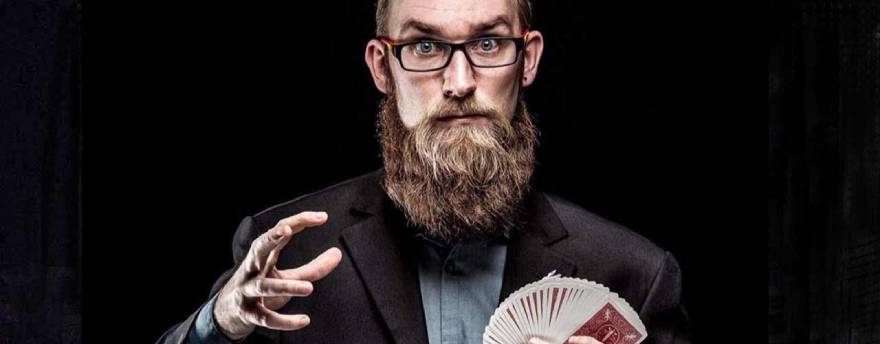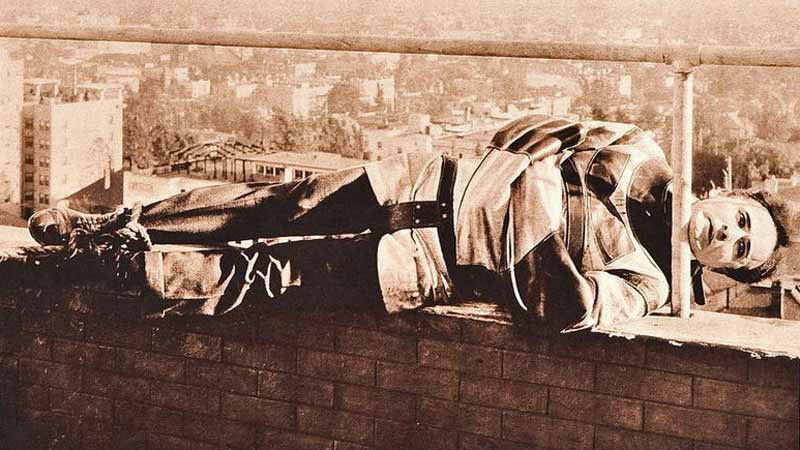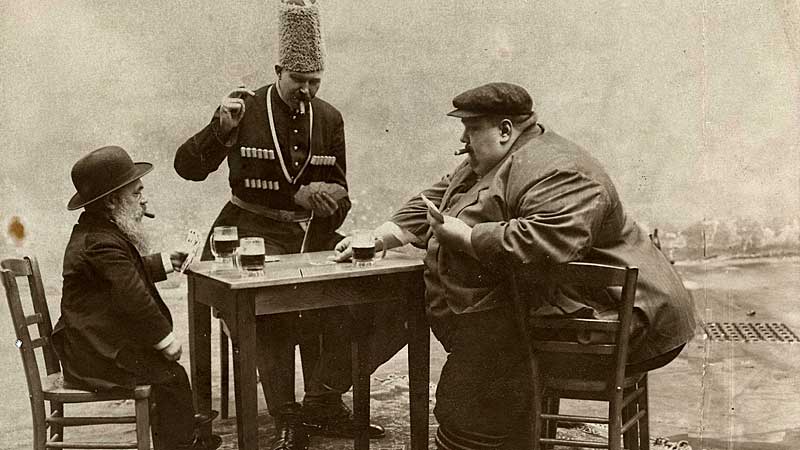Erik Tait's "Submitting Your Magic Invention for Production" Podcast Interview
by Christian Painter and Roland Sarlot

What We'll Explore
Penguin Magic Producer Erik Tait explains the process and options of submitting a magic trick for production and the process of acceptance, manufacturing, marketing, and distribution.
Who is Erik Tait?
Erik Tait won the 2018 I.B.M Close Up Magic Championship, performed on Penn & Teller's "Fool Us," and he works primarily in the corporate close up market. In addition, he is a producer for Penguin Magic and films, directs, edits, and coaches magicians in their magic videos as well as the voice on the "Penguin Magic Podcast." He also helps magic creators bring their products to market.
Running Time:
The following interview has been edited and condensed for clarity.
What you can do
You are welcome to share up to 500 words of the below transcript in a non-commercial purpose provided you credit and link back to our site like this: "The Magic Oracle Business Podcast".
The Interview
Christian Painter: On this episode of the Magic Business Podcast...
Erik Tait: But the main thing when you're sitting there going, "My magic is great, my magic is just as good as everyone who's on that stage right now," the way to do it is to ask. No one will know that you want to do that if you don't let them know.
Christian Painter: Welcome to the Magic Business Podcast, where we share insightful and delightful inner-secrets about the business of magic. This is where magic professionals present their real-life experiences and some of their most guarded secrets to help further your career in the magical arts. I'm your host, Christian Painter, in partnership with the MagicOracle.Club, where you can hear all of our Magic Business Podcasts.
Erik Tait is a professional magician who lives in Columbus, Ohio. He has won the 2018 I.B.M Close Up Magic Championship, he's been on Penn & Teller's "Fool Us," and he works primarily in the corporate close up market. But when he's not doing that, he is a producer for Penguin Magic. He films, directs, edits, and coaches magicians in their magic videos. He is also the voice on the "Penguin Magic Podcast," and he helps magic creators bring their products to market. Welcome to the show, Erik.
Erik Tait: Hey, how's it going, Christian?
Christian Painter: I am kind of excited to have you on today because we're going be talking about something I really don't know a lot about, and that is selling a trick to a magic company.
Erik Tait: Sure. Sure. Yeah, absolutely. Do you have a trick you want to sell me?
Christian Painter: I might. But before we even start that, could you kind of give the listeners a quick overview of who you are with Penguin?
Erik Tait: Yeah. Sure. So my name is Erik Tait. I'm an editor and producer for Penguin Magic. The best way to think of me is when you come to Penguin Magic, I'm the guy you film with or I'm one of the guys you film with. So, you know, we take a look at your trick through the submission process. We decide that we want to have you in, because Penguin wants to produce it. And then when it gets down to the brass tacks, we're going to do actually make the video of the instructions. I'm the guy that you film it with.
So, I'm gonna direct you. I'm going to film you. I'm one of the camera operators as well as one of the editors. So, I'll be the one who does the first pass on the edit. I do the base setup before we add all the fun graphics and everything that that makes it really cool. I'm also the host of our podcast as well as our live stream. So, I got my hands in a lot of pots. But I guess I'm best described as a producer. I help sort of move forward products to market with Penguin Magic.
Christian Painter: I am already impressed on the amount of thought and processes that go on to what you do. I don't think the normal person knows, you know, we just think, "Oh, someone made a trick, they package it up and they sold it," and they think, that's as far as they think. I'm really glad you were so good at describing that process. Then let's start from square one for a moment. Let's say I have a trick, I think is pretty good, now what?
Erik Tait: Well, so, the first thing you can do, and I think this is sort of universal across the way with magic companies do it, I haven't actually worked closely with the other companies, so I don't know their process, so I can only speak to Penguin's, but Penguin's is pretty transparent. There's an area on the website where you can scroll down, it says hatch a trick with Penguin. And on the very bottom menu bar, it's submit a trick. And so, there's an area where you can go and it will walk you exactly through what we need for you to submit a trick.
We need a written description, we need a video performance, and we need a video of the method. When you submit it, you send all of those things, and then a creative team looks at it. And a lot of us are very knowledgeable about different things. You know, I work from my sort of studio home office, where I've got a rather large magic library and I'm constantly consulting my library when we look at submissions and going, "Oh, you know what, this is actually a variation on something from Tarbell volume three, or this is a Marlo thing that's been repackaged, or, this is really new. No one's ever done this before."
And you're sort of making decisions over what are you selling here? Is it a new presentation for an old method? Is this a brand new method? Is this a download? Is it a product, like a physical thing you get in the mail? And all of those are decisions that have to be made and all vary trick to trick, and there's no good rule of thumb. But the first thing to do is just to submit the trick.
Christian Painter: And do you have people who maybe have submitted two, three, four times before, finally, you go, "This is a good one?"
Erik Tait: Oh yeah. You know, we have a lot of people who've submitted dozens of tricks, and the tricks that they submitted in the past just weren't great submissions, either because someone else got there first in a parallel thinking type thing.
Christian Painter: That's kind of funny, it's that parallel sometimes when you see Hollywood two different companies kind of the same sort of movie. That's kind of scary.
Erik Tait: And it happens with magic all the time.
Christian Painter: So, rule of thumb, you can tell me. If you're going down this rabbit hole, then probably don't send that?
Erik Tait: I don't have anything like that. You know, levitation tricks are really popular for people to send. And very often it's a variation on some other hookup or we happen to know somebody's work and it's somebody else's work and they're submitting it to us, or it looks very similar to someone else's work and then we can't take it. But levitation tricks are really popular, so, you know, submit them.
Christian Painter: I mean, obviously, you said you do have times where people just don't realize that they have copied another performer. But you don't normally run into problems with people who are actually stealing, we'll say, from another performer?
Erik Tait: No. And I think we have an internal vetting process that's pretty good at that. When you look at people in the creative team, the breadth of knowledge is pretty wide, but also pretty deep. And a couple of us have pretty significant libraries and extensive history in magic, and also you've got people who've been in the magic industry for years and years and years. So, it's usually when you see something where you're like, "Oh, this is a variation on this work," it's not out and out theft or plagiarism. It's literally just somebody playing around and discovering a concept that they did not realize was already out there.
Christian Painter: So, now I've submitted something to you. You guys are interested. Erik says, "This is a nice variation." What's gonna happen next?
Erik Tait: We'll reach out to you and we'll work out the details on the economics. I'm not going to talk about that on this podcast, but we work out different deals with people so that you get paid, we get paid, and everybody is made whole. The following thing that happens is we work with you to make a decision whether or not you are going to be coming out here to actually film with us and put you on camera, or if it is something where it actually makes more sense to have Nick Locapo present it, or me presents it, or Dan Harlan present it.
And there's a lot of different things that may go into that. So, once we go into that, we'll make the decision to film the instructional video. We'll get that done. At the same time, you're also making the decision as to whether or not it's a physical product, or if it's a download-only. If we decide to make a gimmick, we might film another small video with you that's internal only just how to make it. So, if your gimmick is something that you have made over and over again, you might film something for us, and then our manufacturing team will take it and figure out the most efficient way to make a lot of them.
Christian Painter: So I don't even have to make my gimmick anymore? You will have a team that can do that?
Erik Tait: That is all trick to trick. It all depends. So, a trick that just came out was Paul Vigil’s CSB, that's Paul Vigil’s copper silver brass. Well, it uses a specialized set of coins, and Paul's not gonna mill down coins. It's just not in Paul's wheelhouse, right? Maybe it is something that you produce a lot of, because you are just really good at it, or you've been selling it at lectures for years, and now you wanna take it to a wider market. And so, it's just you can provide it with us. Everything gets worked out trick to trick.
Christian Painter: I like how you said that, because in my mind, when I said gimmick, I was thinking some piece of plastic that I cut out of a piece of plastic, and you went right to, "Oh, you know, we need a lathe or something." And I'm like, wow, we're in different worlds, but I guess you're right. We don't know what that gimmick is or what level we're working.
Erik Tait: And the gimmicks vary all over the place, right? So, we have a very talented group of people in the manufacturing department. Ringing the bell is a really good example of a product that we put out last year. It's a bell, it's a ring flight where the ring appears in the clapper, right? So, our team had to source the bells, disassemble the bells, put all of the secret stuff inside of the bells, then put them back together, right?
You could do that yourself, and you and I can talk about that in self-producing an effect, because it's easier than ever to self-produce effect, even with complicated or unusual props. But our team is able to do that, you know, and obviously that affects the deal because you've got to pay the person who manufactures the gimmick, particularly if they work for you. So, you have to factor all of that cost into the final thing.
Christian Painter: We're going back to cost for a moment. I know you were a little cagey and I understand why you don't want to quite talk about money. But I do wanna bring it out because I think a lot of people think they bring a trick or a book or something to you to market. And they think somehow, that's my Tesla right there. I'll be buying a Tesla. What's the reality?
Erik Tait: I mean, the reality is that the magic market is not huge. We are not selling, you know, we're not selling iPhones here. We're selling marked cards to nerds is what we're doing. So, I think that you have the ability to do well and you will get out of it what you put into it. Any major magic company is going to... You are not going to be making as much when you produce it in partnership with a major magic company, as you would if you self-produced it. Your final profit may not be the same. And let's just break that down a little bit. Whether you go with us or any other company to produce it, what you also have to keep in mind is the logistics portion of it, right? Because producing it is only one part of it, right? Now you have to market it to a group of people. Do you have a list with x-number of magicians who might be interested in this product that you can efficiently communicate with them to?
Okay, now you've communicated with these people who are your potential customers. Do you have a warehouse with a group of people who is going to package that up into a box that is going to then go into the mail via USPS, or FedEx, or whatever it is, and make it safely to the end customer? Right? Are you gonna do that? And can you handle the volume? Right? Because on day one of sales, when a lot of, you know, let's say you've been hyping it for weeks. Let's say you do have the social media presence to be able to get a lot of people are very interested in this product, and let's say you're gonna sell, I don't know. Let's say you're gonna sell 1,000 units on the first day, right? Do you personally have the ability to get a thousand units in the mail that day and get them shipped out to people?
Christian Painter: Well, first of all Erik, I'd say most of us don't have a list where we're even gonna be able to sell 1,000 units in the first month, much less the first day. So, yeah. But that's part of what you're paying for when you bring your product to somebody else.
Erik Tait: Exactly. And so, when you're trying to look at the way the economics work out and you're like, "Well, it costs this and I'm making this, what is the disparity there?" Well, you're making stuff up in volume. But you can do well. And if you self-promote it, you can make a lot more people aware of it and generate buzz about it and then it's just going to have other people doing sort of word of mouth stuff. I can look at the products that did very well this year, and I go, "Oh, well, this particular person was very good at self-promoting it, and also, they reached out to very influential magicians and shared samples with them and said, 'Would you mind reviewing this product on your YouTube or on your Instagram? Is this something that you would share with people?'" That helps you. So, you're looking at a difference between you can get a higher profit margin self-producing something yourself, but you may want to sacrifice some of that margin in order to make a volume, because the volume is going to do better for you.
Christian Painter: Well, it might also come down to it. I'm going to guess that there's really two reasons to, maybe more than two, but two main reasons. One would be for money, but the other one would be for recognition in the magic community.
Erik Tait: Oh, yeah. There's no doubt that having a product produced by a sort of notable and reputable magic company will definitely help you out as far as your next thing. And this is what I said to people even before I joined Penguin. So, before your listeners started sort of going, "Oh, he's a Penguin guy. This is why he's saying this." This is what I've always said. You can ask people. I always say, no, go buy it from the distributor. And the reason for that is because, if I have a hit trick with a distributor that more people are buying it from them, then the next time I submit a trick to that producer, they're gonna go, "Well, this is the guy who brought me that trick that's sold, that flew off the shelves. So, obviously, I'm going to say yes to this."
Christian Painter: Because the people who would submit a trick to you, because that's really the direction we're going here is submitting a trick to you is, I no longer have to worry about, I'm gonna put it in a manila envelope and run through my printer to say, it's this trick. You guys are gonna take care of all of that, right? You're gonna create a great marketing packaging and all that?
Erik Tait: Yeah. Because we have very talented designers on staff, we have people who are accomplished in sales, we have people who know how to design packaging correctly in a way that will be appealing to the customer. But also, I would say that if you're going to self-produce a trick, it's not that hard to do that. And I'll just, again, speaking from my own experience here with Ultra Lucky Coin, when I set out to produce that, I knew the original version of it was a garbage poker chip you bought from Walmart. And then I had found out that you could source crazy thin magnets from China, because a lot of rare earth elements come from China so it's a lot easier to get them to make, you know, sort of insane magnets.
So, the magnet was sort of the breakthrough. And then when I went, "Well, I want to make this nicer," I sourced a poker chip manufacturer, because, as it turns out, you can get on Google and you can search for poker chip manufacturers who will make you custom poker chips for not very much money. So, I started talking to them personally. And then I went to a friend of mine who I knew was an artist. Because when people look at these things, they go, "Well, how do you make this great art?" Well, you don't make it. You pay someone to make it. And it's 2020, if you don't have a friend who's a graphic designer, I don't know where you live. Graphic designers are easy to find, very talented ones too, and they'll work with you on stuff. But seriously, liberal arts major has been around forever. You know a graphic designer.
Christian Painter: Or a quick trip on Fiverr will probably help you out.
Erik Tait: Yeah, exactly. And so, you can sort of describe what you want. You can work with them to get that done, you pay them because that is the ethical and important thing to do. So, then I went down to the packaging and I went, "Oh, well, what do I wanna put this in?" And someone pointed out that makeup tins were really affordable. And so, I went onto a wholesale website that sold tins for makeup. So, the packaging that Ultra Lucky Coin comes in is a sticker that I bought off of Sticker Mule, where I had art designed. I sent the PDF to them. They make it a roll of stickers. And then I bought these makeup tins that are aluminum, that screw top together.
And then I put the poker chip in it. I scrunched up some craft paper, which I got at Office Depot, or maybe even some of it came with some of the packaging from the poker chips that I got stored. So, I was recycling there. And then I slapped the sticker on the top and screwed it all together. And it looks great. It looks like something you would buy off of a shelf in a magic shop, a professionally produced thing. But I did all of that by Googling the different parts and pieces that I wanted, and then assembling them for not a whole lot of money. And the most investment I had was my time because I hand-assembled every single one of those. And that made me think about how I should assemble this. And so, when I do version two, which will be coming out soon, it's gonna be a lot easier for me to manufacture it. I can tell you that.
Christian Painter: Right there, I think, what you've just talked about here is really something I think people can grasp. I don't think people understand how, A, how much work it could take to do this, but also that B, you can do it. And I sometimes am surprised how many people don't realize Google is amazing. You can learn so much. But like you said, it's the work and now you just have to make a decision, do I want Penguin to do it or do I want to do it myself?
Erik Tait: And if you want to lecture, then this is something else. These are skills you should learn. Because the fee for lecturing at a convention or at an I.B.M ring or an S.A.M Assembly is very small. Because these events and these organizations are not working with a lot of money. Where you make your money on lectures is in merch. And I see a noticeable difference in lectures when I walk in with stuff that I spent the time to make look good versus the stuff that was shoved into Ziploc bags and printed at Kinko's that I used to show up to a lecture and it looked like I forgot that I needed merch until the night before.
Christian Painter: Yeah. We've been to those lectures.
Erik Tait: Oh, yeah. And the material in it is good but I regret buying it when I go home and I'm looking to put it with the rest of my magic collection. And when I put it next to these beautiful books that have been produced by Hermetic Press, I don't want those notes next to them.
Christian Painter: No, we all have that. We all have that basket that we have of all the comb bound booklets in, yeah.
Erik Tait: And at the end of your lecture, when someone finishes, you can have the greatest lecture in the world. And if they walk up to your table and it's two sets of computer printed notes with clip art on the front, they're gonna be real disappointed. They may not buy it, right? But if it's got custom artwork, and the cover is nice linen and they open it up and it's all laid out, spelled correctly, the font is interesting, A, you can charge more for that because you spent the time and energy to make it look good, but B, you're gonna get a sale, right? And if you lose the sale, that's money you left on the table.
Christian Painter: Erik, we're coming to the end of the podcast. This is where I put you under pressure. I ask this question to everybody. And that is, you're obviously an expert at bringing a product to market. And I'm sure a lot of people have asked you a ton of questions when they're thinking about doing it. But what's the one question they never seem to ask, but they should be asking? What is that question?
Erik Tait: I started showing up at conventions sort of in 2017, 2018. I started showing up in the convention circuit, doing a lot of lectures, getting rebooked at conventions, getting asked to come back to conventions, being at a convention and being asked to lecture next year. And a lot of people said, "Man, I wish I could lecture at a convention. I wish I could lecture. Man, I wish I could do that." And they stop right there and they go, I wish that I could lecture. And they don't ask the question, how do I get booked to lecture? Because this is a recent thing in my life, right?
I had a day job when I was at a manufacturing company, you know, punching the clock, sitting behind a desk, eating weird sandwiches. And the answer to that question is you ask, right? If you've been to a convention for years and years and you get to know the convention organizer, just say, "Hey, do you have any interest in me giving a lecture at this convention? Maybe not next year or the year after that." And they may go, "Oh, do you have a lecture?" And the answer is, yes. You put together a lecture for you to be able to put out there. But you've got to practice that lecture too before you get to the level you're in conventions, and the way you do that is you lecture at I.B.M Rings, at S.A.M Assemblies, Magic Clubs. And how do you get booked there? The answer is, you ask. The I.B.M, who I'm a member of, and I have lectured at dozens and dozens of I.B.M Rings, and the way I got to lecture at those rings was I went onto the I.B.M's website and I found where they have a sortable list of every I.B.M Ring in the world. You can sort it by region. You get down to state level. I think you can get down to County level in the US. And every one of those has the contact information for the ring president. And so, you draft a very nice letter, introducing yourself, giving any credentials you have, saying the type of magic you have, and asking if the ring would be interested in you giving a lecture. And keep in mind, the first couple of lectures you're going to do are probably free, but that's why you spent all of that time working on that merch so that you can cover your gas and your hotel.
If you're lucky, they'll offer you a lecture fee. Even to this day, I'm an award-winning magician who's been on television and work for one of the largest magic companies in the world. And when I go to lecture for an I.B.M Ring now, some of them just don't have a budget for that. And so, I know that I can sell my products that I've self-produced at that lecture to cover the cost of me going to the lecture and doing it. And the lecture is essentially a pitch for my products. Hey, did you like this trick? Cool. Here's where you can get all the work on it.
But the main thing, when you're sitting there and going, "My magic is great, my magic is just as good as everyone who's on that stage right now. I wish I could lecture." The way to do it is to ask, because no one will know that you want to do that if you don't let them know.
Christian Painter: There you go. Boom. Perfect. Erik, thanks so much for being on the podcast.
Erik Tait: Thank you, Christian. It was a pleasure.
Christian Painter: Thank you for listening to our Magic Business Podcast. Please visit the MagicOracle.Club, where you can hear all of our Magic Business Podcasts and enjoy a vast array of additional magical knowledge. We'd like to leave you with this quote from Asif Ali, "You'll never be criticized by someone who is doing more than you. You will only be criticized by someone doing less than you." As always, we at the Magic Oracle wish you continued success on your path in the magical arts.
A Jolly Genie?

The Magic Oracle is a FREE site but I still must pay dastardly server fees! Please, donate ANY amount... $1, $5, $10, why not $1 million?
THANK YOU for keeping magic alive... and me, a Jolly Genie!



